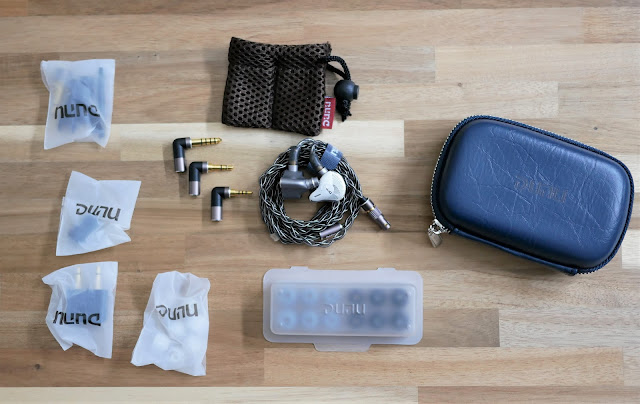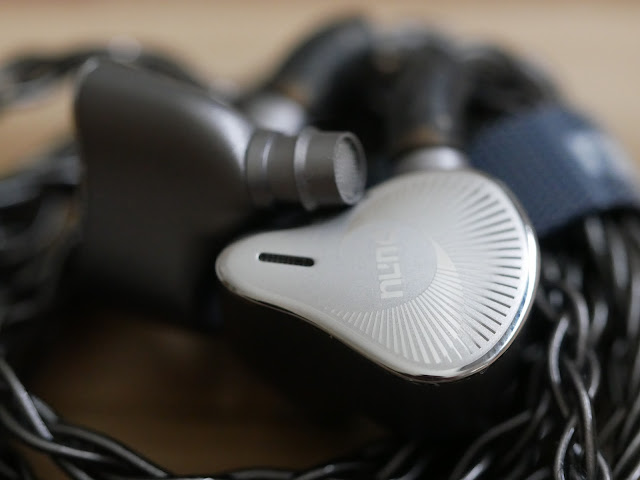The Sonion-developed electrostatic tweeter driver has been gaining a lot of popularity in the past year or two with many manufacturers jumping on this bandwagon. The EST driver, at least in my opinion, combines some of the characteristics of a standard balanced armature driver and some of the high powered electrostatic driver. But, first, let's not confused Electrostatic Tweeter with a real electrostatic driver, like the one used in the Shure KSE-1200 and KSE-1500 or a typical Stax-brand headphone. Those require a separate energizer unit to power the incredibly insensitive drivers. With that said...
Dunu is the latest headphone brand to announce an EST-featured in-ear monitor to their lineup, and this newest model comes in at just $489 and is packed with a pair of EST drivers, as well as their 13.5 mm dual-sided beryllium-coated dynamic driver, and a single custom Knowles BA driver. This new product is called the "EST 112", and the major selling point is the simpler-driver arrangement, which drives the cost down significantly, making this new product the lowest EST tri-brid offering on the market (to my knowledge), cutting down even the Thieaudio Monarch and Clairvoyance twins.
Before I dive into my review, I would like to thank Tom from Dunu for sending this prototype of the EST 112 to me prior to the launch for a preview of the product. I was told that this final prototype's tuning is the same that will be in the production unit, with some possible cosmetic changes for the packaging.
Unboxing
The EST 112 comes in a rectangular box that has a exploded CAD-view of the EST 112's parts on the cover, much like was featured on some of the other Dunu packages prior. The EST 112 comes, again, with a series of tips, a case, and a new cable that I have yet to see or use before. This Dunu cable is reminiscent of the original DUW-02 cable that I really enjoy, but with improved braiding that's thicker, but just as pliable and maneuverable as before. It's aptly called, DUW-02s.
The DUW-02s cable is immensely better than the DUW-03 cable that comes with the SA6 and Zen products. Like the other Dunu products, this cable comes with their patented modular cable connectors that pop off and are replaceable with other heads for different amp configurations.
The metal shells are pretty large, and easily the largest of any of the Dunu IEMs I've tried. There is a reason for this, of course, and that's to house the two EST drivers and their own mini energizers, and the larger 13.5mm diameter woofer. Because of the larger shell size, thicker depth, and angle of the nozzle, I did have some trouble getting a good quality fit with my ears. I do want to note that I do have occasional problems with fitment in my right ear on a variety of in-ears, however this one was troubling all around.
I did manage to get a decent fit and good seal using SpinFit 360 tips, which are wide bore, but a little shallow and designed for true-wireless IEMs. These did give me comfort while wearing the EST 112, though may not have provided the deepest insertion depth possible, although, they did go in my ear fairly well and did not stick out.
The design on the faceplate is a mirrored metal look with a circular fan pattern that remind me a little bit of wings. There is also a chrome-mirror appearance on the bezel of the faceplate that give this unit a shiny, but not too showy look. It's a subtle but classy design.
The face plate also features a slit opening that looks like a vent port. There is another pin hole sized vent on the inner-side of the shell.
Sound Impressions
I was excited to put these on at first because I have grown to really like the Dunu set of gears that they've shared with me over the past 2 years and each one seemed like a step up from the previous release. The latest two units: the SA6 and the Zen are among my favorites in their price class and driver configurations.
When I first put on the EST 112, I did have to play around with several tips to get an adequate level of seal and insertion to give it a fair shake. When I finally landed on the first available tips, I did find the EST 112 to have a little bit of upper mid-range forwardness and a bright shrill sound (shouty?) that wasn't the most enjoyable. I went back to the drawer and pulled out some more tips and finally settled on the Spinfit tips I mentioned previously.
This led me to a much more accurate representation to what I expected from listening to the Dunu EST 112 and more closely aligned with the measurements I took later. The EST 112 presented a fairly neutral tuning, but with a slightly warm lower midrange, and a forward mid-range. This mid-range was still "peaky" at times, but not as bad as when the tips weren't fully seated right. The treble range is fairly smooth, but peaky (confused? more on this later), and does extend a little bit into the upper range, though isn't the most airiest of IEMs I've heard.
The EST 112 has an interesting blend of refinement and rawness to it that is makes me really appreciate it most of the time, but then it'll do something that I feel is slightly lacking. Some of this is due to the tuning, which I do find just a little too sharp in the upper-midrange and it can be a tad fatiguing. When I played through a score of trio-jazz records, the constant cymbals and hi-hats can leave my ears with a little bit of ringing after removing the IEMs.
It is similar to the sensation I mentioned in some of my previous reviews, most notably the written and video review I wrote on the Unique Melody MEST Custom In-Ear. Over time with the MEST, I did get used to this tuning, and my ears adjusted and the sensation subsided. For the most part, this was also the case with the EST 112, but there is still the occasional splashy hit that bothers me.
Despite this kind of uneven upper treble response, the EST drivers do show off their semi-ethereal being on this unit. I think the simplicity of the driver configuration does help drive this point home, and showcases the drivers more so than some of the other offerings I've tried. The treble range has a unique softness that is also well-defined and silky sounding, and it's something I commented on in my Empire Ears Odin and Vision Ears Elysium reviews. It's effortless in its presentation, sans the occasional splashy ringing harmonics.
My little complaints on these little peaks are more than likely due to the inherent frequency response of the EST drivers themselves than anything, as they do have inherent peaks starting at 4 Khz and 13 Khz from memory. That said, for the most part, the EST drivers have a nice sheening effect that does gloss over the peaks a bit where I think a typical BA driver may not be as able to.
The low end of this IEM is powered by the 13.5mm dynamic driver and for the most part it is quick and nimble is less weighty than other tunings I've heard. It's more about precision and speed here, and that's somewhat reminiscent of most beryllium-coated or pure beryllium (Final A8000 or Dunu Luna) in-ears I've heard in the past. This does lend itself to match better with the mid-range BA driver and the EST, however, I do find that there is occasionally a bit of disjointed cohesion between the drivers.
This cohesion isn't a big problem on most tracks I heard, but it was a little bit more noticeable when I listened to Of Monsters and Men's "Hunger." The basslines felt separated from the rest of the track on this one and it didn't feel like one cohesive pack.
That said, though, there is a price and a budget constraint at play here. And most multi-driver-type hybrids and tribrids I've have cohesion issues, and even some multi-BAs in the lower price tiers. There are actually very few IEMs where I feel that the entire frequency spectrum sounds effortless and cohesive as one unit, outside of a single dynamic-driver IEM. Those few cohesive rarities belong in pricier-tiers than this EST 112 at its sub-$500 pricing, which I was as shocked to hear as I've had in while on pricing. Lately, it's the sticker-shock is more on the exorbitant pricing increases and not the opposite.
Comparisons
As previously mentioned, Dunu has released two stellar IEMs in this price category in the recent past with the multi-BA SA6 and the single dynamic-driver Zen. How do these two compare to this new tri-brid EST 112?
Of the three, I probably would choose the Dunu SA6 as my own personal choice, but they all have their own strengths and weaknesses relative to one another that the prospective buyer will have to compromise with.
The reason I like the SA6 more is because it has the most forgiving tonal balance of the three, has the smallest and most comfortable fit, and my personal favorite in the looks department. Of course, your miles will vastly vary as each SA6 is unique due to its use of real stabilized wood with varying stain colors that is a surprise at unboxing. The SA6 lacks a little bit of low end girth and dynamics compared to the others as well.
The Zen offers the most organic and realistic sound, with a very punchy and warm presentation using its single dynamic driver, and more so than the EST 112. I find the Zen's presentation the most forward and in-your-face of the three, which is a little too intimate for my personal tastes (I like open and wide space for my musical choices), and the occasional shrills of the treble peaks in the 8-9K, which is also apparent in the EST 112.
In actual tonal balance, the EST 112 and Zen have the most in common. They both have a warmer mid-range body, with a bit more upper-midrange energy than the SA6 and a slight peak at 8-10KHz that can cause a little ringing for my ears.
But the EST 112's electrostatic tweets does smooth out this characteristic more so than the SA6 and I find it's treble response the most interesting and smooth of all three.
So the quick comparative version:
Bass: Zen
Mids: Zen or SA6
Treble: EST 112
Soundstage: SA6 or EST 112
Imaging: SA6
Dynamics: Zen
Transient Speed: EST 112
Resolution: SA6 or EST 112
Fit: SA6
Style: SA6
Cable: EST 112's DUW-02s by a mile
Wrap-Up
Do I like the EST 112? Yes, it's pretty good. Is it my favorite? Probably not. But it does treble a bit differently than other products in this price range, and that's a unique characteristic it has. Dunu has 3 solid units now in this price class that can compete with others. I do think that this is maybe my least favorite of the three mentioned here, but it can hold its own against others.
It is in tough competition with the Moondrop Blessing 2 and Blessing 2 Dusk, which are priced lower, but this one also brings to the table the latest driver technology and the typical Dunu package of goodies which are a step above most of its competition.
--
View the product ratings on
Antdroid's IEM Ranking List and/or Antdroid's Headphone Ranking List








Comments
Post a Comment